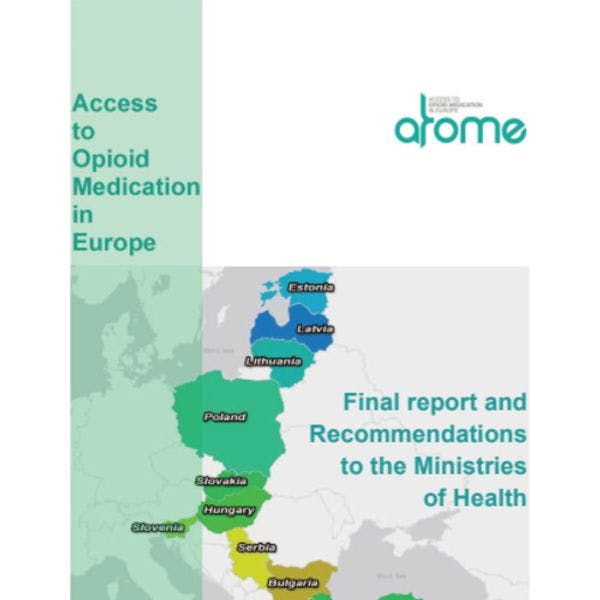Accès aux médicaments à base d’opioïdes en Europe : rapport final et recommandations aux Ministres de la santé européens
Les pays européens doivent surmonter plusieurs obstacles dans leurs législations nationales et stratégies politiques afin d’améliorer l’accès aux opioïdes à des fins médicales. Pour en savoir plus, en anglais, veuillez lire les informations ci-dessous.
Abonnez-vous à l'Alerte mensuelle de l'IDPC pour recevoir des informations relatives à la politique des drogues.
This report presents the outcomes of the Access To Opioid Medication in Europe (ATOME) project funded under the European Union’s 7th Framework Programme. The project investigated why opioid medicines for moderate to severe pain and for the treatment of opioid dependence are not used adequately in twelve European countries, and developed tailor-made solutions for improved access to opioid medicines in these countries. The intended readership of this report is regulatory and law enforcement authorities, policy makers, opinion leaders, and healthcare professionals.
Background and problem statement Opioid medicines are the mainstay of medical treatment of severe pain and breathlessness, and the treatment of opioid dependence. They are effective and cheap medicines to relieve unbearable suffering from physical symptoms in severe progressive illness, and to prevent unnecessary harm and deterioration of health in people suffering from opioid dependence.
For these reasons, WHO defines opioid medications as essential medicines. Due to their potentially harmful effects, opioids are defined as controlled substances and are controlled under the Single Convention on Narcotic drugs. The purpose of this treaty is to prevent the misuse of controlled substances while guarant eeing their availability for scientific and medical use. This implies a dual obligation for governments– that is, to implement regulations and policies that help to prevent potential harm resulting from opioids while ensuring that they are adequately available, accessible and affordable for those in need of them (the ‘principle of balance’ ). However, in many countries the emphasis is on control and restriction, hereby unduly interfering with availability of opioid medicines.
Scientific research undertaken within the ATOME project provided information on four areas relevant for access to opioid medicines: challenges concerning policy and guidance on access to opioids, legal and regulatory barriers, policy barriers, and the perception of barriers indifferent stakeholder groups.
A consensus process with experts from law and governance, public health, human rights, palliative care and pain treatment, and harm reduction revealed the difficulty of defining concepts such as ‘rational (medical) use’ versus. ‘misuse’ of controlled substances, and reflected the challenge of outweighing the risks and benefits of certain substances. The consensus process underlined the complexity of political guidance in balancing between control and
availability, between protection and harm.
An in-depth evaluation of the legislative and regulatory barriers in the participating countries found a wide range of potential barriers in the national legislation. The review identified potential legal and regulatory barriers in the following areas: prescribing, dispensing, and usage of opioid medicines; trade and distribution; manufacturing; affordability; penalties; and language. The outcomes of the legislation review resulted in detailed reports for each of the countries, describing the potential barriers, explaining the potential negative impact of the respective provisions on access to opioid medicines, and making a set of recommendations on how to lift these barriers and thereby improving th e availability of opioids for those in need of them.
The findings of the review of national policies illustrate that beside barriers in the national legislation there are also several challenges concerning national policy strategies with regard to improved access to opioids and the use of these medicines for medical treatment. A detailed analysis of documents collected throughout the ATOME project and discussions with national stakeholders showed major challenges to opioid access in four areas; financial and economic aspects and governmental support, formularies, education and training, and societal attitudes. The analysis resulted in individual reports for each country, including recommendations on how to address the identified barriers and improve access to opioid medicines in relation to country specific backgrounds.
Several of the countries participating in the ATOME project are already in the process of revising legislation and policies, and implementing recommendations for improvement. As a result, several changes in legislation and policy have already come into force, lifting potential barriers to access to opioids.
Keep up-to-date with drug policy developments by subscribing to the IDPC Monthly Alert.
